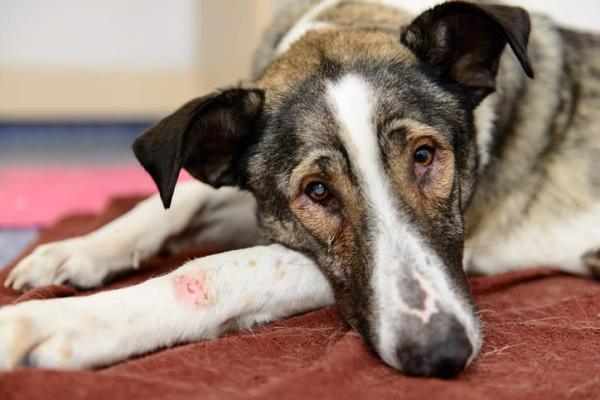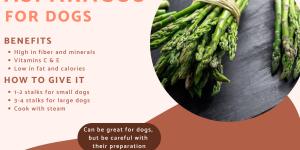Is Honey Good for Dogs?



See files for Dogs
Honey, especially raw honey, is one of those natural products that is often recommended to treat multiple ailments in humans. Its excellent properties make it the perfect home remedy to fight a sore throat, provide energy, whet your appetite or heal wounds. So, you might wonder, are the benefits of honey applicable to dogs? Can dogs eat honey and is honey good for dogs?
The short answer is, yes, honey can be beneficial for dogs, if given in moderation. In this AnimalWised article we look at how honey can be good for dogs and discuss the benefits and uses of honey in dogs with different ailments. We will also explain what types of honey dogs can eat, how much honey you can safely give your dog, and cases in which honey could be harmful for dogs. Read on to find out all about honey for dogs.
Is honey safe for dogs?
Yes, a moderate amount of honey is safe for dogs, and can even be highly beneficial. Raw honey contains natural sugars and useful nutrients that make it an ideal natural sweetener. Its properties also make it the kitchen cure we most often reach for to treat ailments like coughs or wounds. Honey can be used to treat many of these same ailments in dogs, although it is important to remember that dogs process foods differently from humans, so it is best not to give your dog honey the same way you would a human. In later sections we will explain how to use honey for your dog and how much honey dogs can eat.
Honey is usually safe for adult dogs. However, it is not recommended to give raw honey to young puppies because their digestive and immune systems are still developing. Raw honey can contains bacterial spores that can cause botulism in puppies or dogs with weak immune systems. Furthermore, honey is not recommended for obese or diabetic dogs, due to its fairly high glycemic index. A good rule of thumb is to consult your veterinarian before introducing natural foods like honey in your dog's diet.
What kind of honey can dogs eat?
Now that you know dogs can eat honey, you may ask yourself whether dogs can eat any type of honey. In fact, not all the types of honey are suitable for dogs, because they do not all have the same properties. The mass-produced and highly processed honey sold in supermarkets retains very few natural nutrients, and provides more sugars than anything else. You can recognize processed honey by observing its color and texture, which is normally transparent.
Raw honey, on the other hand, is never completely translucent. We recommend giving adult dogs organic, locally produced, raw honey. This kind of honey keeps intact the natural vitamins, minerals and enzymes which give it its beneficial properties. Organic raw honey is also free of added sugars, preservatives or artificial sweeteners.
Almost all varieties of honey are good for dogs, since each of them has particular properties that can benefit a dog's health. So, if you have a jar of raw honey at home, do not hesitate to use it for your dog too. The only types of honey that you should avoid giving your dog are those made from the nectar of plants that are toxic for dogs, such as marijuana honey.
Is Manuka honey good for dogs?
Manuka honey is one of the most appreciated kinds of honey for natural medicine in humans. Therefore, people often wonder if it has the same benefits for dogs. Manuka honey is made from the nectar of Manuka trees in New Zealand and Australia. This variety of honey has been growing in popularity in recent years. It is known for its antibacterial and antimicrobial effects which make it effective at healing wounds and preventing infections[1]. The same results have been demonstrated in animals[2], so we can conclude that Manuka honey is good for dogs and offers them the same medicinal benefits.

Nutritional benefits of honey
Dogs can eat honey, but why is honey good for dogs? As we mentioned in the previous section, each type of honey has specific properties depending on the nectar it is made from. These properties translate into different benefits in each variety of honey. However, in general, all honeys share some common characteristics and benefits. Honey is good for dogs because of the following:
- Honey is a source of energy because it contains natural sugars, mainly fructose and glucose. 100 grams of honey contain 300 calories. Of course, your dog should get most of its calories from a balanced and healthy diet, but a small amount of honey can sometimes give a dog just the boost of energy they need.
- Honey is also rich in minerals, the most notable being calcium, phosphorus, magnesium, potassium and sodium.
- It contains vitamin C and some types of B vitamins.
As we hinted earlier, the nutrients and enzymes in honey give it plenty of medicinal properties that are also applicable to veterinary medicine. Among others, honey is has a calming effect and is known its for its diuretic, laxative, anti-inflammatory, antioxidant, antiseptic and antibacterial healing properties.
Benefits of honey for dogs
Having looked at the nutritional and medicinal properties of honey, it is clear that there are many ailments in dogs that honey can help to treat or prevent. For example, initial studies have shown that honey may help treat external otitis in dogs[3]. Below are some more common ailments and conditions in which honey can be good for your dog:
Honey for dogs with cough
Thanks to its soothing, anti-inflammatory and antiseptic properties, honey is an excellent remedy to relieve the symptoms of respiratory tract infections or inflammation in dogs. Remember that honey has a high fructose content, so don't give your dog too much honey when they have a cough. You can prepare a tablespoon of honey with a squeeze of lemon for dogs with a cough and/or sore throat and give it to them before bedtime.
Of course, if your dog has a cough or throat condition that does not improve, we recommend you visit the veterinarian as soon as possible to find out the cause and get a course of treatment. Your dog may be suffering from infectious tracheobronchitis, more commonly known as kennel cough. Honey alone cannot fight the infection, and while the vet may approve the use of honey to soothe the dog's cough, they will also prescribe medication to eradicate the disease. Here is an article with more information on how to treat kennel cough.
Honey to heal wounds in dogs
Honey is one of the best natural remedies to heal wounds in dogs, having proven antibacterial properties that help treat wounds and heal broken or burnt tissue. So much so that more and more veterinarians now use medical grade honey to treat flesh wounds, minor ulcers and burns. To use honey to heal your dogs wound, simply apply a layer of honey on the wound. Don't cover the honey with plaster and make sure to prevent your dog from licking it. The honey creates a protective film over the wound and helps speed up the healing process. .
Honey for malnourished dogs
Honey is also good for malnourished dogs because it provides energy, vitamins, minerals and antioxidants. It goes without saying that a balanced and healthy diet is the only sure way to cure undernourishment in dogs, and honey should never form the basis of a dog's diet or be given in large quantities. However, because of its sweet taste, honey can be instrumental in getting dogs who have lost their appetite to start eating again. A small amount of raw honey - a tablespoon, for example - provides an extra dose of glucose and fructose, which can help whet the dog's appetite and encourage them to eat.
Honey for sick or convalescent dogs
Thanks to the energy it provides through its sugars, as well as its healing properties, honey is also beneficial for sick or convalescent dogs. It can be used, as described above, if the dog seems to have lost its appetite. A good method to help your dog start eating again is to mix a teaspoon of honey with plain yogurt (without sweeteners) and offer this to your furry friend. Yogurt is also good for dogs, being rich in probiotics which promote the balance of intestinal flora and aid recovery.
In convalescent dogs that are hospitalized or receiving intravenous serum, a solution of honey diluted in water can be used. This can be fed directly into the dog's mouth, using a syringe without a needle. Of course, any of these remedies should be administered with the approval and supervision of the veterinarian.
Honey for dogs with anemia
Honey contains some iron, although there are other much more iron-rich foods foods better suited for dogs with anemia. Honey is good for anemic dogs thanks to the energy it provides, since the lack of iron tends to make the dog weak and tired. It may also help prevent anemia, if incorporated as a regular part of the dog's diet. In a later section we will explain how to add honey to your dog's diet and how much honey it is safe for them to consume.
Honey for constipation in dogs
Raw honey has laxative properties and is recognized as a potential prebiotic food. Prebiotics are foods that stimulate the growth of beneficial bacteria found in the intestines, helping to keep your dog's gut healthy. In this case honey acts as a preventive, since a dog with a healthy digestive system is less likely to suffer from constipation. In addition, honey's laxative properties can aid the elimination of fecal matter and help fight constipation in dogs. Here is an article with more information on diet for constipated dogs.

Risks of honey for dogs
Honey is safe for most adult dogs, and we have seen how honey can be good for treating and preventing multiple aliments in dogs. However, as we mentioned earlier, there are also cases in which it is better not to give your dog honey. Puppies under the age of one should not be given honey unless recommended by a veterinarian. Similarly, honey should be avoided or given with caution to diabetic dogs or dogs that are overweight, since it has a high fructose content. It can still be applied topically in such dogs, but make sure you consult the vet before feeding honey to an obese or diabetic dog. Apart from these, raw honey is not known to have other contraindications. However, if your dog suffers from kidney disease or hypertension, or may be allergic to bees, it is again best to consult a vet before deciding to give your dog honey. Also remember to maintain your dog's oral hygiene, since the sugar content in honey can lead to tooth decay.
How to give honey to dogs
Depending on the reason you want to give your dog honey, you can feed them the honey directly, dilute it or add it to a recipe for homemade dog food. If you decide to dilute the honey, you can use either water, lemon juice or a chamomile infusion. Dogs can also eat honey directly, from a tablespoon, for example. Finally, you can add honey as a natural and nutritious sweetener to a homemade recipe, such as cookies for your dog.
How much honey is safe for dogs?
Due to the sugars it contains, dogs should only eat honey in moderation. We recommend a maximum of one tablespoon (or two teaspoons) a day. Of course, this amount will vary depending on the age, size and health of your dog, as well as other specific considerations. This is why it is crucial to consult a veterinarian to decide on the appropriate amount of honey to give your your dog.
If you want to read similar articles to Is Honey Good for Dogs?, we recommend you visit our Homemade diets category.
1. Maddocks, S. E., et al. (2012). Manuka honey inhibits the development of streptococcus pyogenes biofilms and causes reduced expression of two fibronectin binding proteins. Microbiology, 158(3), 781-790.
https://www.microbiologyresearch.org/content/journal/micro/10.1099/mic.0.053959-0
2. Tramuta, C., et al. (2017). Antibacterial activities of Manuka and Honeydew honey-based membranes against bacteria that cause wound infections in animals. Schweiz Arch Tierheilkd, 159(2), 117-121.
https://www.ncbi.nlm.nih.gov/pubmed/28174146
3. Maruhashi, E., et al. (2016). Efficacy of medical grade honey in the management of canine otitis externa - a pilot study. Vet Dermatol, 27(2).
https://www.ncbi.nlm.nih.gov/pubmed/26929137
- Irish, J., Blair, S., and Carter, D. A. (2011). The antibacterial activity of honey derived from Australian flora. PLoS ONE, 6(3): e18229. Retrieved on 6 November, 2019.
https://journals.plos.org/plosone/article?id=10.1371/journal.pone.0018229 - Knowles, G. (2016). Healthy cooking for your dog. Sphere Books.
- Mohan, A., et al. (2017). Effect of honey in improving the gut microbial balance. Food Quality and Safety, 1(2), 107-115. Retrieved on 6 November, 2019.
https://academic.oup.com/fqs/article/1/2/107/3860141







